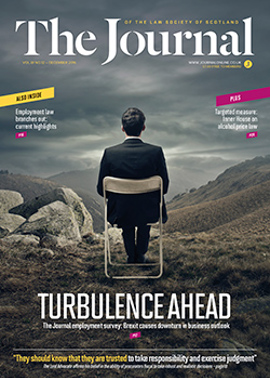Brexit: helping to shape the outcome

The Law Society of Scotland in terms of its strategy for 2015-20, Leading Legal Excellence, seeks to influence a fairer and more just society by being an international centre in thought leadership.
One of the aims of the newly established Research Unit is to lead public policy research on law reform in Scotland and the United Kingdom on issues affecting the Scottish legal profession and civic society.
The unit is organising a series of Brexit-themed seminars by bringing together leading authorities from the Scottish legal profession, the academic community and policy experts to analyse the key issues in the UK’s withdrawal from the European Union. Each seminar will consider a specific area of law and how the UK’s relationship with the EU will affect it, both in terms of substance and procedure.
The inaugural event on 3 November, chaired by the President, Eilidh Wiseman, and focusing on the constitutional impact of Brexit, saw excellent presentations from the three speakers: Professor Stephen Tierney, Christine O’Neill and Andrew Tickell. Round table discussions followed, and some interesting themes arose.
More than 70 delegates attended and 385 watched the live stream. Fortuitously, the High Court judgment on article 50 was issued on the same day.
The rise of the referendum
Discussion focused on what was described as a “growing appetite for referendums”. What may be seen as traditional democratic process, with decisions being made by our appointed representatives, is shifting to public decisions by referendum.
Mechanisms of direct democracy are always difficult, and particularly so within the EU with its lack of federal structure. Maintaining a balance between representative and direct democracy has always been a challenge. Even if the place of lawful referendums is accepted, the question is how to manage their outcomes, as referendums can only yield Yes or No answers. Professor Tierney noted that neither the question put to the electorate nor the provisions of the Act under which the referendum took place gave any guidance as to the process or date of withdrawal in the event of a vote to leave. This has created the controversy over the process by which an article 50 notification to withdraw should be triggered.
The High Court judgment decided that the UK Government does not have the power to exercise the Crown prerogative to give the article 50 notice. Issues for delegates ranged from whether there would there be a second referendum on Brexit, the implications for the Government’s article 50 timetable, and the possible effect on the hard/soft nature of the Brexit arrangements. The doctrine of parliamentary sovereignty framed much of the discussion. The Supreme Court decision following the Government’s appeal remains much anticipated.
Independence and the Scotland Act
No discussion would be complete without considering Scotland’s position. This element was passionately led by Andrew Tickell. The SNP’s 2016 manifesto stated: “We believe that the Scottish Parliament should have the right to hold another referendum” on independence, “if there is a significant and material change in the circumstances that prevailed in 2014, such as Scotland being taken out of the EU against our will”. Following Scotland’s divergent views from the rest of the UK, the Scottish Government has published a draft bill for consultation in relation to a possible second referendum, “to protect Scotland’s place in Europe” and the single market.
These developments raise a series of fascinating constitutional questions. In terms of the domestic constitution, does Holyrood have the legislative competence to pursue such a poll? In terms of constitutional politics, is it a legitimate move? Above and beyond these questions, what implications will Brexit have – legally and politically – for the iteration of Scottish independence which the SNP might argue for? Does Holyrood have any power, within the Union, to resist Brexit? Failing which, what are the implications for devolution?
Brexit – hard, soft or in between?
Christine O’Neill’s presentation provided the backdrop for discussion on what Brexit may look like. Nearly six months after the vote, the UK Government’s preferred outcome from the Brexit negotiations remains unclear. Consideration was given to possible options in terms of a future relationship with the EU – including membership of the European Economic Area, the Customs Union or a much “harder” Brexit.
Nissan’s decision to invest in the UK suggests an intention to pursue a tariff-free trade arrangement with the EU and the possibility of membership of the Customs Union, similar to Turkey. Implications of each option for key issues such as free movement of workers and the need for increased border controls were also reviewed. There has been a growing debate over the language of hard/soft and whether it is appropriate, since it provides what is now frequently referred to as a binary view. In other words, hard/soft is a polarised argument but the reality may be something in the middle, with continuing relationships and collaborations.
Outcome and future seminars
It is anticipated that these seminars will inform the Society’s thinking on the post-Brexit legal landscape and, using social media, create a forum for continuing dialogue.
The next seminar, at Glasgow Caledonian University on 23 February 2017, will consider the human rights implications of Brexit.
In this issue
- FAI Rules: a guide to the consultation
- Saying sorry – is it enough?
- Repairing obligations for common parts
- Journal reader survey feedback report
- Reading for pleasure
- Tax: is your firm paying over the odds?
- Opinion: Judith Robertson
- Book reviews
- Profile
- President's column
- Altered deeds? Mind the rules
- The clouds gather
- Turning points: employment law into 2017
- Policy and the public interest
- Above the minimum
- Where code meets custom
- Child orders: mind the gap
- EU law, a family affair
- People on the move
- Information age?
- The limits of free web access
- Tenant farming: the new guidance
- Insolvency: cross-border clashes
- Foul play on the agency front
- Scottish Solicitors' Discipline Tribunal
- Comm prop and the Holy Grail
- Leisure – the serious side
- New anti-money laundering support
- Law reform roundup
- Brexit: helping to shape the outcome
- Transition to Lockton – your questions answered
- Expertise plus: promoting a sector strength
- Paralegal pointers
- Time to look back – and forward
- Everything comes...
- Ask Ash






